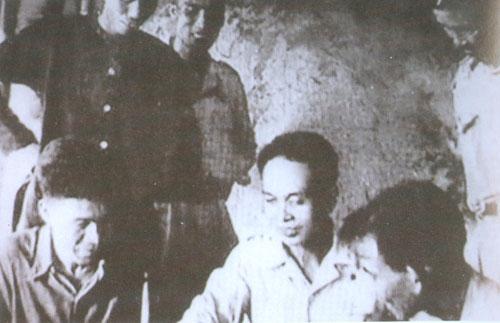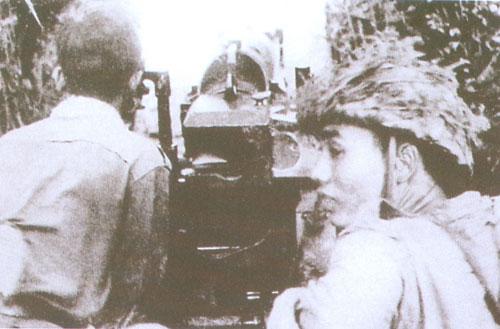Chi tiết tin - Quảng Bình (Tiếng Anh)
From national resistance to Dien Bien Phu Victory
On the night of December 19, 1946, under the direction of the Party Central Committee led by President Ho Chi Minh, Vietnamese troops carried out the first big fire exchange in all cities and provinces occupied by the French troops to hold back the enemy and instigate warfare throughout the country. In the capital city of Ha Noi, the center of the fight, in two months, five battalions with 2,515 soldiers and 8,000 capital militia, equipped with rudimentary weapons had pinned down 6,500 French soldiers equipped with cannons, tanks, aircrafts and 7,000 French armed people. The Vietnamese armed forces had defeated the strategy of the enemy: "Fast Strike, Fast Victory".
On January 20, 1948, President Ho Chi Minh conferred on Commander-in-chief Vo Nguyen Giap the military rank of General.
Since September 1955, General Vo Nguyen Giap had been in charge of several posts, such as Minister of Defense, Commander-in-chief and Chief Political Commissar of the Vietnamese People’s Army, and Secretary of the Party Central Committee’s Military Commission until the two resistances ended.
Vo Nguyen Giap commanded the Bien Gioi, Hoa Binh, Tay Bac (North West) and Thuong Lao (Upper Laos) Campaigns to defeat six commanders of the French expeditionary armies respectively. Particularly, in the Dien Bien Phu campaign, which was a hallmark in Vo Nguyen Giap’s military career, the Vietnamese army first defeated a bastion of imperialism and signaled the end of colonialism.
Before the National Resistance broke out, his father Vo Nguyen Giap married Dang Bich Ha, the eldest daughter of professor Dang Thai Mai.
In the resistance against the French colonialism, his father Vo Quang Nghiem was arrested, detained, and later executed in Thua Phu prison in Hue.
The resistance of southern Vietnamese people
On September 2, 1945, at Ba Dinh Square, President Ho Chi Minh read the Declaration of Independence, giving birth to the Democratic Republic of Viet Nam. He formally declared to the world that "Viet Nam has the right to be a free and independent country and in fact, it is so already". Nevertheless, only 21 days later, on September 23, 1945, the French invaded Viet Nam again, this time, Southern Viet Nam. This act resulted in the re-emergence of the resistance movement of the Viet Nam people to defend the freedom and independence of then country.
 |
|
Sai Gon army and people fighting during the first days of the Resistance. (Photo: Ben Thanh market, Sai Gon September 23, 1945). |
 |
|
The army and civilians in provinces in Southern Vietnam attacked French military vehicles |
 |
|
The army and civilians in Can Tho gathered 105mm cannons from the French troops |
 |
|
In response to President Ho Chi Minh's call, from September 1945, Vietnamese soldiers began their march to the South |
 |
|
Minister of Interior Vo Nguyen Giap and Head Commissioner of Defense for Nam Trung Bo (southern part of Central Vietnam) Nguyen Chanh examined a battle plan in Ninh Hoa, Khanh Hoa (January 1946) |
 |
|
Minister of Interior Vo Nguyen Giap was sent to Nam Trung Bo (southern part of Central Viet Nam) by President Ho Chi Minh to supervise the military situation in Ninh Hoa, Khanh Hoa (January 1946). Sitting next to him is lawyer Phan Anh |
 |
|
In Cuu Quoc (National Salvation) Newspaper of the General Committee of the Viet Minh, there was an article about Minister of Interior Vo Nguyen Giap's one-month inspection tour to Trung Bo (Central Viet Nam). The purpose of the tour was to visit the Trung Bo Front and examine administrative work in the localities |
The national-resistance against French colonialism broke out
The diplomatic activities of President Ho Chi Minh and the Viet Nam government expressed the hope for peace, yet the French deliberately waged a war to invade Viet Nam again. On December 19, 1945, President Ho Chi Minh stated that we wanted peace we then had to make concessions; yet the more concessions we make, the more encroaching the French colonialists were, since they determined to invade our country again". President Ho Chi Minh affirmed his determination: "We would rather sacrifice everything than lose our country and become slaves". He called out to the people: "Should you be a Vietnamese stand up to fight against the French colonialists to save our country. Who has guns should use guns, who has swords should use swords; those without guns and swords should use mattocks, spades and bamboo sticks".
 |
|
Appeal to National Resistance by President Ho Chi Minh |
 |
|
Receiving Minister of Defense and Commander-in-chief Vo Nguyen Giap's Order for National Resistance, the Vietnamese army marched day and night to the battlefield |
 |
|
In response to President Ho Chi Minh's Appeal to National Resistance, Minister of Defense and Commander-in-chief Vo Nguyen Giap gave the Order for National Resistance |
|
|
|
A woman in the Capital Militia getting ready to fight |
 |
|
A soldier in the death squad of the Capital City Regiment |
 |
|
Minister of Defense Vo Nguyen Giap visited the Capital City Regiment after it withdrew to Thuong Hoi, Dan Phuong following 60 days of undauntedly fighting the French in the city's streets and houses in an effort to keep the unit intact for long-term resistance. |
 |
|
Minister of Defense Vo Nguyen Giap and representatives attending the National Conference of Political Commissar from March 6 to 11, 1948. |
 |
|
Minister of Defense Vo Nguyen Giap on his way to the battlefield in the Viet Bac-Thu-Dong (Autumn-Winter) campaign in 1947. |
 |
|
Artillerymen fighting in the Viet Bac-Thu Dong campaign in 1947 |
 |
|
A French warship was shot and sank on Lo river, Doan Hung, Phu Tho, in the Viet Bac-Thu Dong campaign in 1947 |
Source: "Commander-in-chief General Vo Nguyen Giap" Book
- Pre-uprising period, general uprising & establishment of democratic republic of Vietnam (26/10/2013)
- International friendship (26/10/2013)
- Vo Nguyen Giap: Vietnam’s last centurion* (27/10/2013)
- Hometown, youth and revolution (23/10/2013)
- General Vo Nguyen Giap's devotion to science-technology, culture and art (19/10/2013)
- An exemplary man (19/10/2013)
- The book “Dien Bien Phu: five miracles never seen before in history of war” in Egyptian (17/10/2013)
- Palestinian newspaper carries book on Dien Bien Phu battle (17/10/2013)
- Contributions of General Vo Nguyen Giap highlighted (17/10/2013)
- A passenger through the century (15/10/2013)




